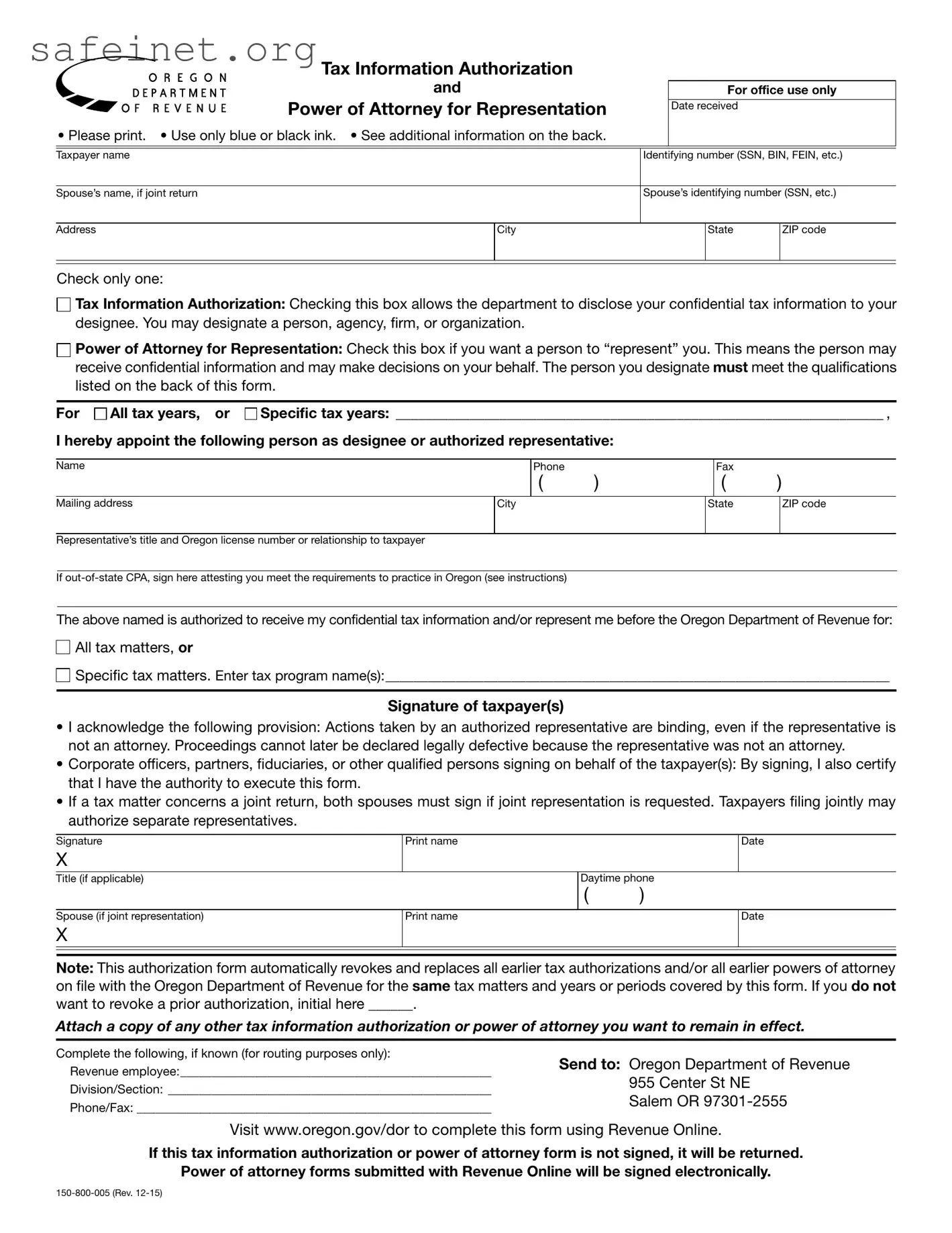The IRS Form 2848, known as the Power of Attorney and Declaration of Representative, serves a similar purpose to the Tax POA 150-800-005 form. Like the POA 150-800-005, the IRS Form 2848 grants an individual or organization the authority to represent a taxpayer before the IRS. Taxpayers can specify the types of tax matters and tax years covered by the authority. This allows appointed representatives to discuss tax issues on behalf of the taxpayer, simplifying communications and assistance with tax-related matters.
Form 8821, the Tax Information Authorization, is another document that shares similarities with the Tax POA 150-800-005. While it does not allow someone to represent a taxpayer in disputes, it authorizes the named individual or organization to receive confidential tax information from the IRS. This form enables someone to obtain important details regarding a taxpayer's account without the capability to act on behalf of the taxpayer, focusing instead on information retrieval.
Tax power of attorney forms vary by state, such as the California Form FTB 3520, which allows a designated representative to handle tax matters with the California Franchise Tax Board. The structure and purpose reflect the Tax POA 150-800-005, granting authority over specific taxes and ensuring that the representative can address taxpayer concerns directly with the state tax agency. Similar to the Tax POA, the California version includes a clear specification of the powers granted and the periods they cover.
State-specific POA forms also exist, like the New York State Department of Taxation and Finance Form POA-1. It grants authority for tax matters to a designated person, making it comparable to the Tax POA 150-800-005. This form allows representatives to perform tasks such as filing returns, receiving notices, and negotiating on behalf of the taxpayer. This ensures that taxpayers have someone qualified to advocate for their interests with state tax authorities.
The IRS Form 8822, Change of Address, may not be a power of attorney form, but it is essential for managing tax matters. This form allows taxpayers to update their address with the IRS, ensuring that any correspondence and tax-related documents go to the correct location. A well-maintained address is crucial, as it allows both the taxpayer and any authorized representative to stay informed about their tax obligations and any potential issues.
The IRS Form 4506-T is a request for transcript of tax return, which can be utilized by taxpayers or appointed representatives. Although it does not provide power of attorney, it allows the holder to access tax information. This form is critical for understanding past tax filings, which can aid in any ongoing tax discussions or disputes, making it a useful tool parallel to the Tax POA 150-800-005.
Form 706, the United States Estate (and Generation-Skipping Transfer) Tax Return, is another important document relating to tax representation. While it is not a power of attorney, it is prepared by a representative who may be designated through a power of attorney form. The importance lies in ensuring that estate taxes are correctly filed on behalf of a decedent, highlighting the collaborative role that power of attorney forms play in handling tax matters, especially in intricate cases.
Furthermore, the IRS Form 4506, Request for Copy of Tax Return, allows taxpayers and their representatives to obtain copies of previously filed tax returns. Though it does not confer protective powers like a power of attorney, it facilitates the process of gathering necessary documentation for any tax-related issues. Representatives can access these copies to ensure that they have the correct information when advising or assisting clients.
Additionally, the Washington State DOL's Power of Attorney for Vehicle Transactions serves a purpose similar to the Tax POA 150-800-005 but applies to vehicle registration and related matters. This document allows an appointed agent to manage vehicle transactions, including registration and title transfers. It highlights the broader concept of empowering another individual to handle specific legal requirements on one’s behalf.
Lastly, the Health Care Proxy acts as a form of power of attorney for health care decisions. It allows individuals to appoint someone to make medical decisions on their behalf if they become unable to speak for themselves. While it is distinctly different from a tax power of attorney, it embodies the same principle of giving authority to another person to handle important matters, emphasizing the importance of having designated representation in various aspects of life.











 All tax matters,
All tax matters, 
